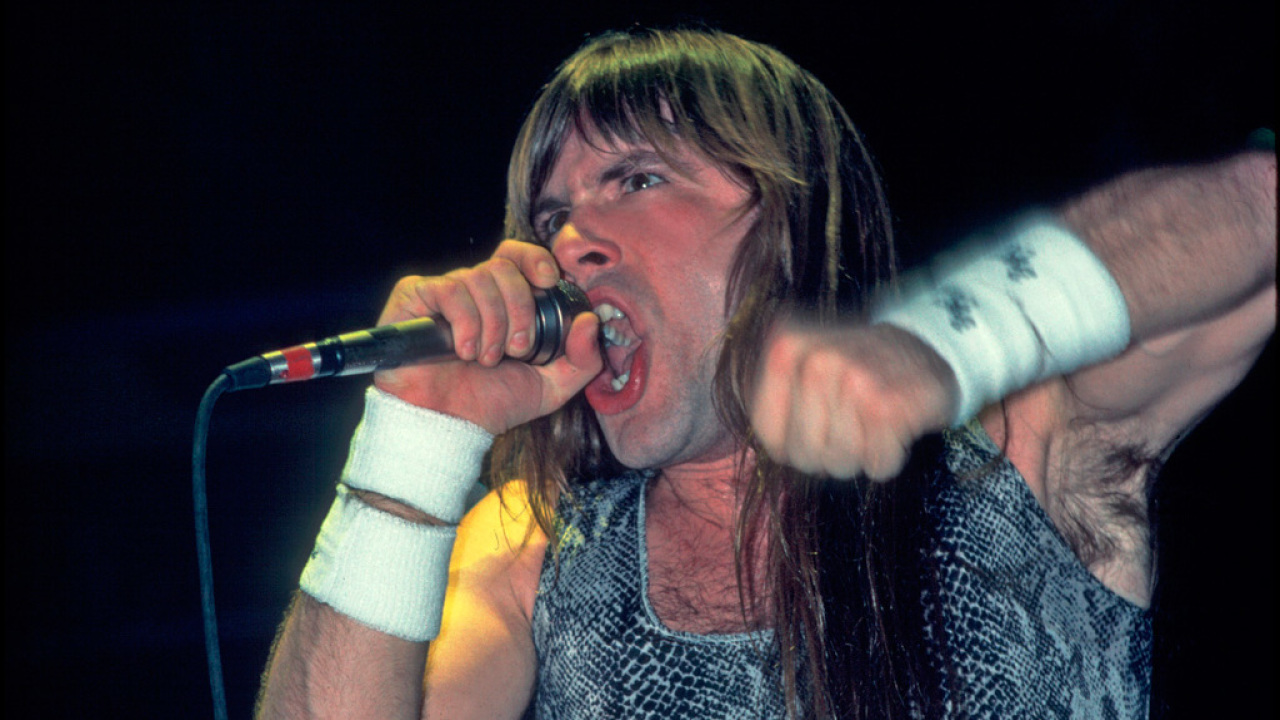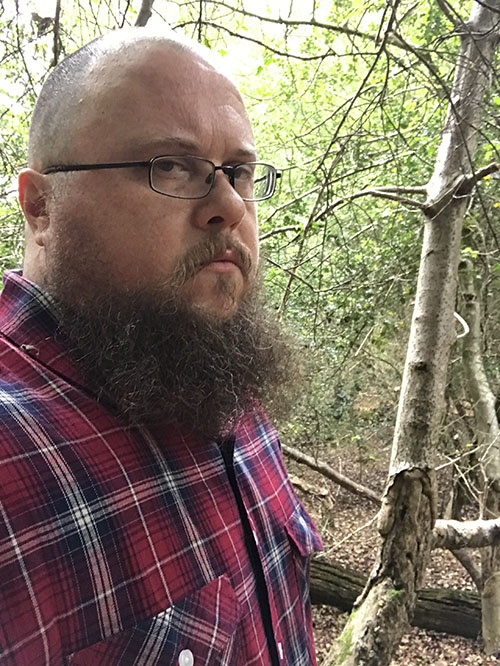As today is National Poetry Day, we present ten of the best metal songs inspired by poems – from Iron Maiden to Nightwish.
Today is National Poetry Day! And poems are basically metal songs but without the urge to headbang and air guitar like a DEMON. But they are full of incredible imagery, and have inspired some of the biggest bands in heavy metal to write epic, ripping anthems.
Here are ten of the best metal songs inspired by poems.
Iron Maiden – Rime Of The Ancient Mariner (Powerslave, 1984)
Poem: Rime Of The Ancient Mariner (1798)
Poet: Samuel Taylor Coleridge
This is the no-brainer, the high watermark of heavy metal’s poetic renderings. Steve Harris’s bravura Powerslave finale remains a pinnacle of literary epic metal, admirably boiling down Coleridge’s doomed fable about what not to do if a bird shits on you to fourteen minutes of thrilling compositional genius.
“One after one, by the star-dogged Moon,
Too quick for groan or sigh,
Each turned his face with a ghastly pang,
And cursed me with his eye.”
Celtic Frost – Sorrows Of The Moon (Into The Pandemonium, 1987)
Poem: Tristesses De La Lune (1857)
Poet: Charles Baudelaire
Baudelaire’s languid erotic verse clearly held special fascination for the Swiss pioneers on their avant-garde masterpiece; Tom G Warrior groaned this English translation over thrusting Gothic thrash-doom, while the original French version was interpreted on a classical female-fronted bonus track.
“This evening the moon dreams more lazily,
As some fair woman lost in cushions deep,
With gentle hand caresses listlessly,
The contour of her breasts before she sleeps.”
Cathedral – A Funeral Request (Ethereal Architect) (Forest of Equilibrium, 1991)
Poems: Requiem/Sombre Sonnet (1901)
Poet: David Park Barnitz
Bassist Mark Griffiths discovered this obscure American in Lovecraft fanzine Dagon, later forging a bond between the poet’s nihilistic decadence and the downcast morbidity of Cathedral. Lines from Barnitz’s obscure volume The Book Of Jade fit seamlessly into the hallucinogenic, dejected aura of this seminal doom debut.
“White-rose perfume,
Go with thee on thy way,
Unto thy shaded tomb;
Low music fall,
Lightly as autumn leaves,
About thy solemn pall;
Faint incense rise.”
Manowar – Achilles, Agony And Ecstasy In Eight Parts (The Triumph Of Steel, 1992)
Poem: The Iliad (circa 750 BC)
Poet: Homer
Fearlessly taking on the great-grandaddy of all epic poems, Manowar decided they only needed one side of vinyl to retell Homer’s ancient Greek Trojan War document in spectacular style. “Joey DeMaio’s lyrics imply a careful and scrupulous reading of the Iliad,” enthuses Eleanora Cavallini, Professor in Classics at Bologna University.
“Now don’t come back to the hollow ships, you hear
Patroclus, mighty horseman –
Not till you’ve slashed the shirt around his chest,
And soaked it red in the blood of man-killing Hector!”
Bolt Thrower – …For Victory (..For Victory, 1994)
Poem: For The Fallen (1914)
Poet: Lawrence Binyon
It had to be Bolt Thrower to give Binyon’s First World War ode of remembrance the appropriate metallic treatment, and Coventry’s finest combat-obsessed death machine growl out the poignant words – penned 100 years ago this month – with rumbling menace and bitterness.
“They shall grow not old, as we that are left grow old:
Age shall not weary them, nor the years condemn.
At the going down of the sun and in the morning,
We will remember them.”
Iced Earth – Dante’s Inferno (Burnt Offerings 1995)
Poem: The Divine Comedy: Inferno (1308)
Poet: Dante Alighieri
A dizzying seventeen-minute tour de force of American heavyweight power metal, succinctly paraphrasing the epic journey of Virgil and the pilgrim through the nine circles of Hell from this dark, medieval Italian masterwork of world literature.
“Cerberus, cruel, monstrous beast, with three throats
Barks doglike over the people submerged there.
His eyes are red, his beard greasy and black, his belly large
And his hands have talons; he claws the spirits, flays and quarters them.”
Ulver – Voice Of The Devil (Themes From William Blake’s Marriage Of Heaven And Hell 1999)
Poem: The Marriage Of Heaven And Hell (1790)
Poet: William Blake
Norwegian black metallers Ulver turned the scene on its head with this dark, labyrinthine, ambient electro trip-hop setting to Blake’s dark cosmic prophecies. Those who’d prefer a more heavy metal exploration of this work should try Virgin Steele’s 1994⁄95 albums The Marriage Of Heaven And Hell Parts I and II.
“The original Archangel or possessor of the command of the heavenly host is called the Devil, or Satan, and his children are called Sin and Death.”
Primordial – The Hosting Of The Sidhe (Storm Before Calm, 2002)
Poem: The Hosting Of The Sidhe (1893)
Poet: William Butler Yeats
“One of Eire’s greatest sons,” writes Alan Averill of the Dublin band’s primary Irish poetic inspiration, whose brief poem stirring the underground deities of Celtic folklore, the Sidhe (or people of the Faery Hills), to ride again the wild wind, makes for an unorthodox, supernatural album closer.
“Our cheeks are pale, our hair is unbound,
Our breasts are heaving, our eyes are a-gleam,
Our arms are waving, our lips are apart;
And if any gaze on our rushing band,
We come between him and the hope of his heart.”
Drudkh – The Price Of Freedom (The Swan Road 2005)
Poem: Haidamaky (1841)
Poet: Taras Shevchenko
The Ukrainian black metallers’ entire 2005 album takes its lyrics from Shevchenko’s radical, violent epic poem describing the 1768 anti-Polish rebellion in the Ukraine – “a historic horror narrative, barbaric in its intensity,” according to textbook Domains And Divisions Of European History.
“By midnight I was covered by the ravens,
They peck kazaks’ eyes,
But don’t wanna peck corpses.
I, green, grew black
And for your freedom
I will be green again.”
Nightwish – Song Of Myself (Imaginaerum 2011)
Poem: Song Of Myself (1855)
Poet: Walt Whitman
Tuomas Holopainen attempted perhaps the boldest, most complex poetic retelling by penning his own, identically-titled version of Walt Whitman’s acclaimed American epic, with lyrics that subtly echo, absorb and celebrate the themes and forms of the much-revered original.
“A child said ‘what is grass?’ fetching it to me with full hands,
How could I answer the child? I do not know what it is any more than he.
I guess it must be the flag of my disposition
Out of hopeful green stuff woven.”

